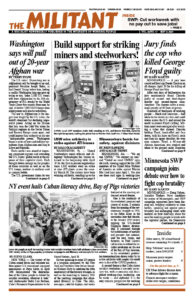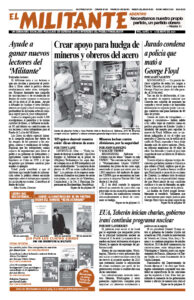LONDON — After a five-year legal battle by taxi drivers and their union, the Supreme Court ruled Feb. 19 that Uber should recognize its drivers as workers and pay them the minimum wage and holiday pay. Drivers are discussing how to advance the fight for a union against bosses who are determined to undermine any gains that workers make.
James Farrar and Yaseen Aslam, former Uber drivers and leaders of the App Drivers and Couriers Union, took Uber to the London Employment tribunal in 2016. Since then drivers have organized protests and work stoppages in London and elsewhere against taxi bosses’ arbitrary suspensions and firings, and for better wages and working conditions.
The court case highlighted the exploitative conditions app-based drivers face. It was supported by the GMB union, which filed a parallel lawsuit. Uber fought the case tooth and nail. Its appeals were twice rejected before the Supreme Court issued a final ruling.
Locked in fierce competition with other taxi bosses, Uber has profited by classifying drivers as “independent contractors,” foisting the costs of running and maintaining vehicles onto them and only paying them a small fraction of fares. Uber now says its drivers will receive the statutory 9 pound ($12.50) hourly minimum wage, and holiday pay based on 12% of their income. It says it has initiated a process for drivers to seek compensation for lost income and also a pension plan.
Aslam and Farrar in a statement pointed out that Uber says it will only pay drivers the minimum wage from when they accept a ride, not the whole time the driver is logged onto the Uber app. Drivers often wait in their cars for long periods for people to book a ride.
“I think the ruling is good,” Uber driver Ashraf Ahmed told Andrés Mendoza, Communist League candidate for London mayor. “Maybe I can make a living on driving again.” Ahmed said that though he had worked for Uber for many years he has had more difficulty making ends meet recently. Mendoza said his campaign calls for one union for all cab drivers — black cabs, private hire, and app-based drivers — in order to fight for better wages and conditions.
Mendoza also spoke with Abdirahman Mohamud and Hassan Ali about the ruling. They are members of the App Drivers and Couriers Union who participated in drivers’ protests in 2018 and 2019.
“We don’t have any confidence in Uber,” Mohamud said. “We are just numbers to them.” He pointed to bosses’ refusal to end the arbitrary firing of drivers based on customer ratings or complaints without any say from the driver. “The company just blocks the driver from logging into the app,” he said. “They can just send a note to Transport for London that then revokes our license, which we paid 500 pounds for.”
“A driver who never had a drop of alcohol in his whole life was terminated, with no right to appeal, following an alleged customer complaint he was drunk,” Ali added.
Aslam and Farrar additionally challenged Uber’s jealous guarding of its unilateral decisions over workers’ expenses. “This must be subject to collective agreement,” their statement said. Uber needs to “make progress towards trade union recognition.”
Uber employs 40,000 drivers in London. During the pandemic, drivers’ income has fallen alongside passenger numbers. Bosses cut fares to compete with their rivals, while the costs of insurance and licenses for drivers remain the same. Drivers must also pay a 15 pound daily London “congestion charge.” Last June Mayor Sadiq Khan hiked it by 30% and extended it to cover weekends in the name of stopping the spread of coronavirus. Many taxi drivers quit driving.
“The ADCU is demanding ride-hailing companies not be allowed to take more than 15% of the fare instead of 25%,” Ali told Mendoza. “This can only be won by united action by all drivers.”

